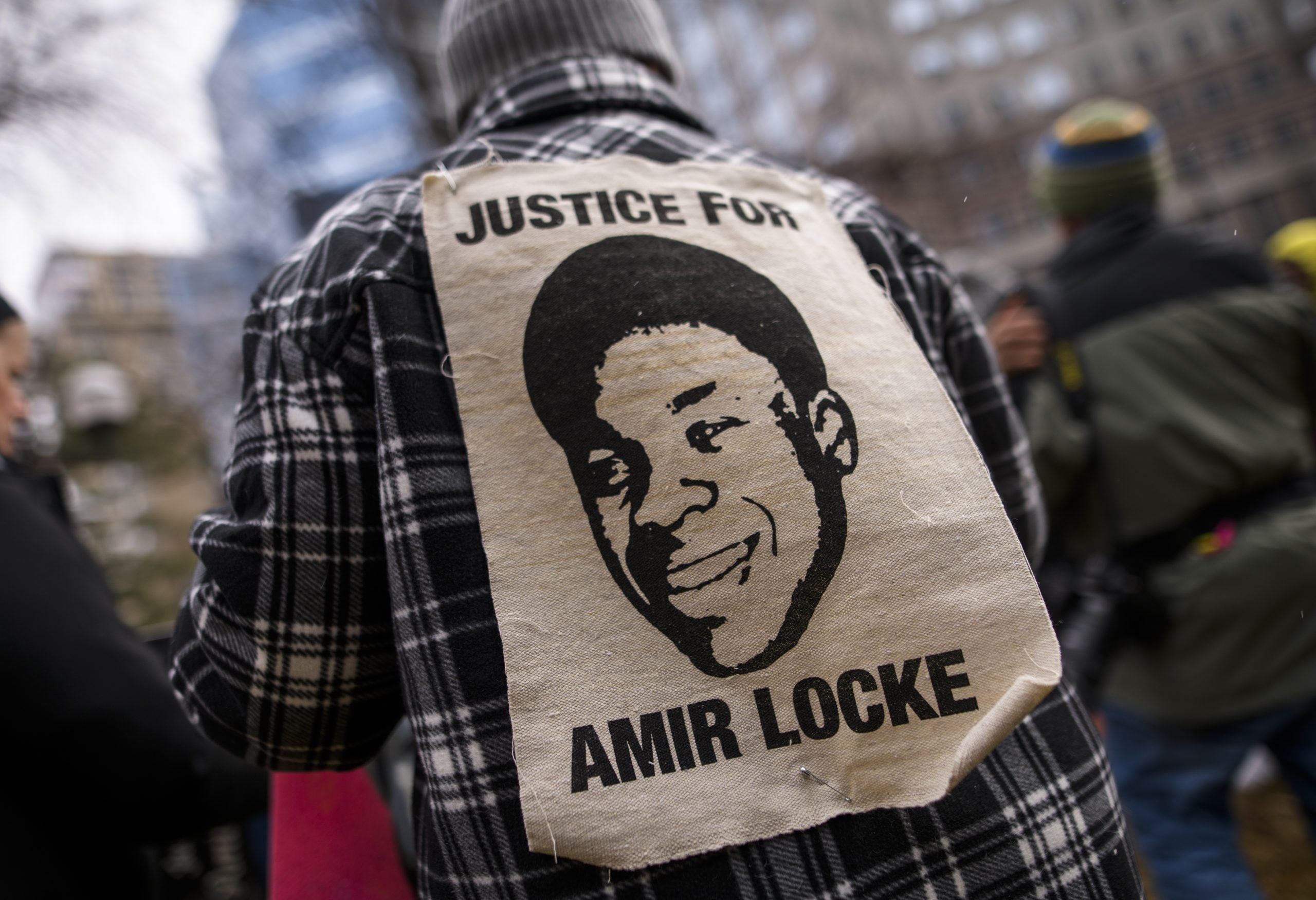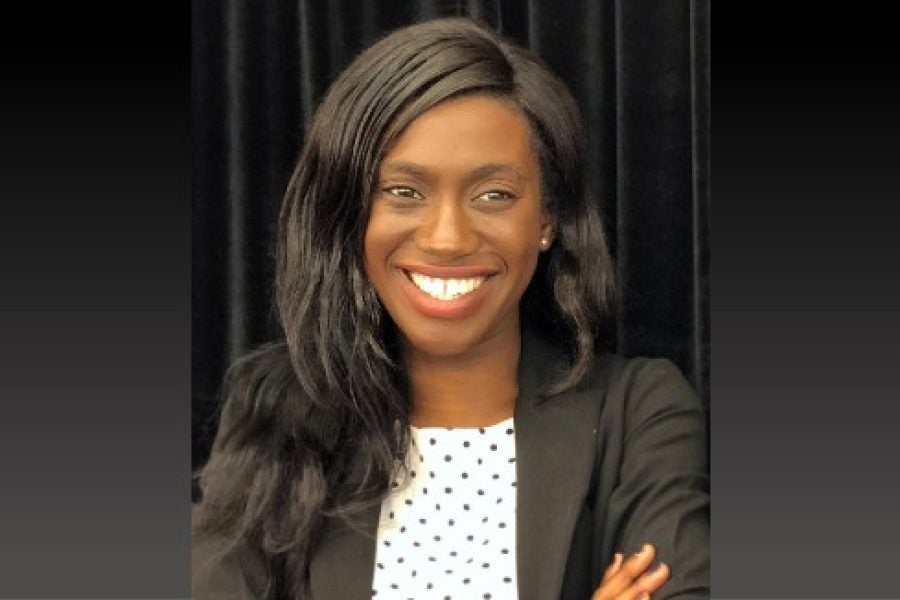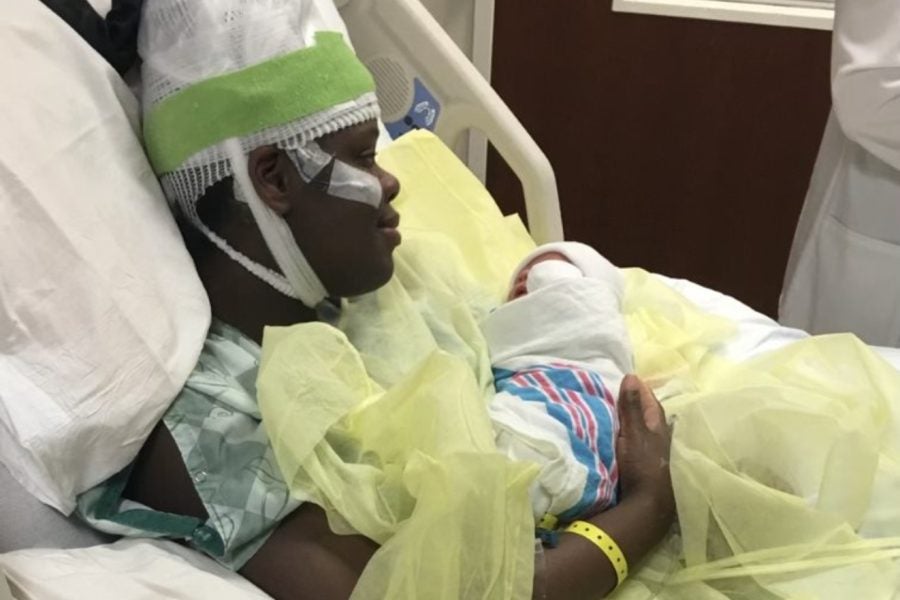
Karen Wells is the mother of two Black boys. Her youngest son Amir was her shadow. He would cling to her leg for comfort and safety. At the time she didn’t know why, but looking back she holds onto those memories like he held onto her.
When Amir was 12, his mother watched news anchors tell the story of a Black boy killed on his way home from the corner store. He had Skittles in pocket. Soon after, Wells took her two sons to a protest calling for justice in the murder of Trayvon Martin.
Ten years later, hundreds of protestors marched in below freezing temperatures, calling for #justiceforAmirLocke. They marched for Amir like Amir marched for Trayvon.
“I still don’t believe it,” Wells says. “I pretend he’s on vacation. I’ll say he’s on vacation somewhere, and I’ll see him. But I’m not going to see him right now.”
Amir Locke was killed by police on February 2, 2022.
Family members describe 22-year-old Amir as caring, hardworking and in love with music. He dreamed of following in his father’s footsteps and becoming a musician.
In a song entitled “Treacherous,” under the stage name Big Seemo, Locke seems to prophesy his own death, warning that “people only show that they love you when you been laid to rest.”
After Amir was killed, his life– and death– provoked hashtags circulated in his name and protests marched in his honor. But news cycled to the next story and social media moved onto the next trending topic. His family, his mother, remain stuck at a lonely and painful crossroads somewhere between moving forward in the fight for justice and remaining frozen in a time that changed their lives forever.
The Incident
Locke was in Minneapolis working for Doordash and trying to save money before he returned to Texas, his mother shares. There, he hoped to support his dreams of music and entrepreneurship.
Going to Minneapolis signified temporary separation from his friend, his confidant, and his life-long advocate – his mother.
“He said, ‘I’m coming back.’ And I said, ‘Okay,’ and I gave him a hug. Then, when I was going to work my eyes filled with water. I’ve never seen him in person since.”
On February 2, 2022 Locke was asleep on his cousin’s couch when the Minneapolis Police Department charged into the apartment armed with a no-knock warrant in search of property relating to a murder. Within 10 seconds, SWAT officer Mark Hanneman shot and killed Locke.
No charges were filed against Hanneman. The Hennepin County Attorney’s office called Locke “a victim,” in a news release announcing the decision.“He should be alive today, and his death is a tragedy,” the statement read. “Amir Locke was not a suspect in the underlying Saint Paul criminal investigation nor was he named in the search warrants.”
The night Locke was killed, he was sleeping with a handgun legally purchased for protection during his Doordash runs. Officers fired shots upon seeing the gun in Locke’s possession.
In bodycam footage released by the Minneapolis Police Department, Locke was instructed to drop the gun only after he had already been shot three times – twice in the chest and once in the wrist.
The Minnesota Attorney General reviewed the case and ruled that the presence of Locke’s registered firearm “constitutes a specifically articulable threat.” Officers wore full tactical gear, including bullet-proof vests and bullet-proof helmets to protect crucial arteries such as the heart and the brain. Amir Locke had a blanket when he was killed.
“I’ve never finished the video in its entirety,” says Wells. “I just…I’m his mother. I can’t. He was my baby.”
The exact language of the public information report written by the Minneapolis Police Department reads, “Officers encountered a male who was armed with a handgun pointed in the direction of the officers. An officer fired his duty weapon and the adult male suspect was struck. Officers immediately provided emergency aid and carried the suspect down to the lobby to meet paramedics.”
However, the bodycam footage released to the public does not show him being offered medical aid. Instead it shows officers piling on top of Locke as his body reacts to being shot multiple times. Shots were fired at 6:48 a.m. Medics declared Locke dead 13 minutes later, at 7:01 a.m.
Amir Locke’s mother remembers being “inconsolable” after getting the call from her ex-husband. “I couldn’t even think straight. When I tell you I couldn’t even pack a suitcase. I forgot how to pack a suitcase.”
“I can’t believe it. Maybe they made a mistake. Maybe it’s not true.”
The New Normal
Before his death, Amir’s creativity led him to design a shoe that his mother plans to market. She also handles the business side of his non-profit.
No charges were brought against the officers in Amir’s case, but his mother is determined to pursue justice through every avenue available to them.
Wells does all of this while working full time, being a grandmother to the 5-year-old daughter of her oldest son, and advocating for the abolition of no-knock warrants.
“I have to continue to work for him. I have to speak for him. We have to be his voice for anything that he wanted to do.”
She’s made her life an extension of all that her son wasn’t able to do in his life.
“Whether it is a mother [whose] son was murdered by the police; whether it’s a mother who lost her child to a mass shooting; whether it is a mother who lost her child to the streets – their lives transcends to something bigger than themselves something that they never signed up for,” describes her sister Linda kay Tyler.
Tyler has witnessed every aspect of this transition of her sister’s life.
Wells has dedicated a portion of her bedroom to a shrine honoring Amir, complete with his portrait on a canvas. A variation of his name is on her license plate, and a detailed illustration of his face is tattooed on her arm.
“Justice to me would be [that] the police officer needs to be fired. He needs to be brought in front of a grand jury and let them determine his fate. I wouldn’t be mad either way if they choose to say yay or nay [to Hanneman being charged]. I would respect them. But at least let the process occur,” Wells insists.
No charges were brought against the officers in Amir’s case, but his mother is determined to pursue justice through every avenue available to them.
As of November 2022, Mark Hannen is still a Minneapolis police sergeant. With hurt in her eyes, Wells is firm in her belief that “I’m gonna get justice all the way. I don’t care, by any means necessary. But you’re not going to keep saying Amir did nothing wrong, and let this police officer walk around here and think that he got away with murdering somebody’s 22-year-old son.”
Amid movements to defund the police, Wells has a personal relationship with police reform. “I get so sick of hearing [about] defund the police. I’m not pro police. I’m not anti-police. I’m pro Amir Rahkare Locke. That’s what I am.”
What Can Be Done
Legislation, while slow to be enacted, is a viable way to reform broken systems. There are also ways to support families in their search for justice.
Following public outcry, there was a temporary ban on no-knock warrants in the city. In April 2022, Mayor Jacob Frey announced a proposal that would mandate knock-and-announce warrants, which would require officers to knock repeatedly while executing warrants. But today, his proposal hasn’t become law. And while no-knock warrants aren’t currently being executed, there is no legislation prohibiting them.
Amir Locke’s family is currently telling his story in a documentary on no-knock warrants that will debut in August 2023 at the Tylermann Film Festival.
Organizations like Communities United Against Police Brutality rely on the help of volunteers to create reports based on their own independent investigations.
Many families struggle financially for months or even years after losing their loved ones to cover funeral expenses, attorney’s fees and the lost wages of not being able to work because of extreme grief.
As mothers like Karen Wells work to make the world that took their sons a safer place for the children of others, nothing can replace what has been taken from them. Still,
Listening to their continued pleas for allyship, action, and reform can prevent the repeat of this kind of loss for another family.
These families, who form a tragically growing list, lean on each other for support, for strength. Sometimes a part of that strength is used to tell their stories at another legislative hearing.
Other times, that strength is what gets them out of bed in the morning.







